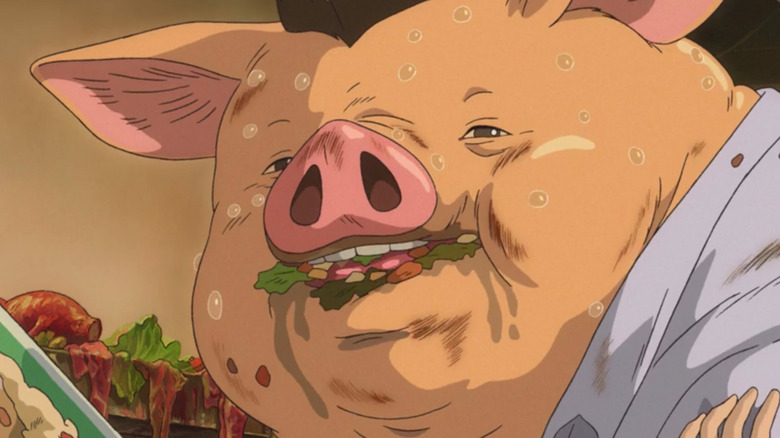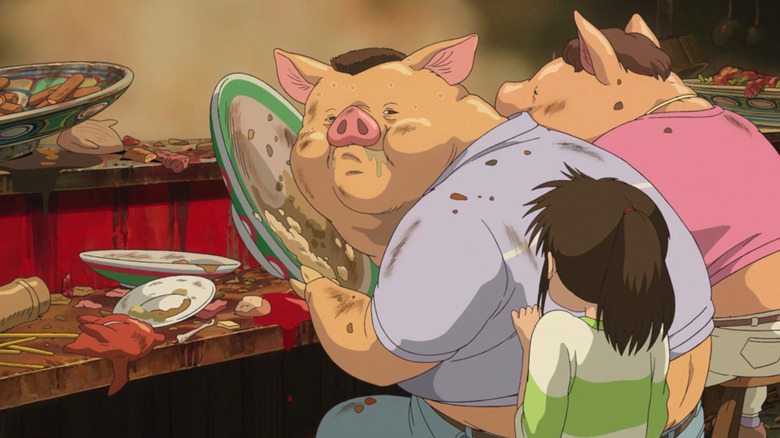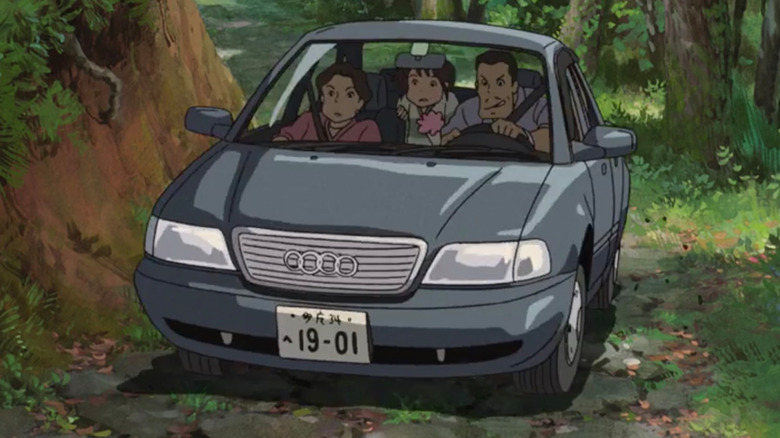The Detail About Chihiro's Parents In Spirited Away That Means Way More Than You Think
Hayao Miyazaki's 2002 film "Spirited Away" is a masterpiece, the kind of movie full of symbolism and metaphor that rewards repeat viewings. Many of the film's details aren't fully explained, and fans have been pondering their meaning for the last twenty years.
One of the film's most memorable sequences happens within the first ten minutes. After Chihiro's (Daveigh Chase) family makes a wrong turn and winds up in the spirit world, her parents Akio (Michael Chiklis) and Yūko (Lauren Holly) stumble upon an unattended restaurant full of the most delicious food imaginable. They start devouring it, and shortly later are magically transformed into pigs.
Fans have been debating how this scene should be interpreted. Many have understood it to be a symbol of Akio and Yūko's gluttony, but it's a bit more complicated than that.
Fortunately, Studio Ghibli itself has shed some light on what the pig sequence really means. Here's what director Hayao Miyazaki was going for.
The pig sequence isn't about gluttony, it's about consumerism
The answer comes from Twitter exchange between Studio Ghibli and user @0910nocha. The Tweets have since been deleted, but their contents were reported and translated in a 2016 article for Rocket News 24.
The exchange started when @0910nocha reached out to Studio Ghibli with several questions about the meaning of the film, starting with why Chihiro's parents turn into pigs in the first place. The short answer is that it's a metaphor for consumerism.
According to the translation, the Ghibli employee responded that Chihiros parents undergo their transformation in the same way that Japanese people "turned into pigs" during the country's bubble economy in the 1980's. After years of over-consumption, "these people are the ones saying, 'We are in a recession and don't have enough to eat,'" the letter explains. It goes on to say that the transformation into a pig is irreversible, and that people gradually take on the "body and soul" of a pig. Most importantly, this isn't a phenomenon limited to fantasy worlds like the one in "Spirited Away." It happens in the real world, too.
The letter asked another pig-centric question that's been on many viewers' minds: at the end of the film, how did Chihiro know that her parents weren't among the herd of pigs? Many have assumed that it's because Chihiro develops some kind of magical powers during her time in the magical realm. According to the Studio Ghibli employee, however, it was nothing more than ordinary human intuition. Chihiro's time in the magical world gives her the "energy to live," which awakens her instincts.
However, the anti-consumerism message goes a lot deeper than the pig sequence.
In fact, Spirited Away is one big anti-consumerism metaphor
"Spirited Away" came out in 2001, but the film is set some time in 1995 or 1996. Chihiro's father drives a 1996 Audi A4 1.8 T, and he brags about how new and top-of-the-line it is.
This setting places the movie a few years after the Japanese economic bubble of the 1980's and 1990's burst. During that time, Japanese society underwent rapid and unsustainable growth. This led families like the Ogino to discard their past conformism and embrace consumerism. Studio Ghibli chose the Audi A4 1.8 T for a reason. It's not just a car, it's a luxury imported vehicle that signifies the family's status and wealth (via The Harvard Crimson).
The story can then be seen as a metaphor for the changes Japan underwent following the burst of the economic bubble. When Mr. and Ms. Ogino enter the spirit world, they're not just transformed into pigs. They experience a complete loss of status, falling from their comfortable middle class position to becoming literal farm animals. On top of that, Chihiro is forced to take a job Yubaba's (Suzanne Pleshette) bathhouse, making her a child laborer.
In the end, it's only Chihiro's growth that makes it possible for the family to return to the land of the living. Her parents remain oblivious. That's an ominous note for the generation of Japanese who became adults during the economic bubble, but a somewhat more optimistic one for the future.


